Module 11 Way of life Unit 1 课件+音频(共36张PPT)外研版八年级上册
文档属性
| 名称 | Module 11 Way of life Unit 1 课件+音频(共36张PPT)外研版八年级上册 |
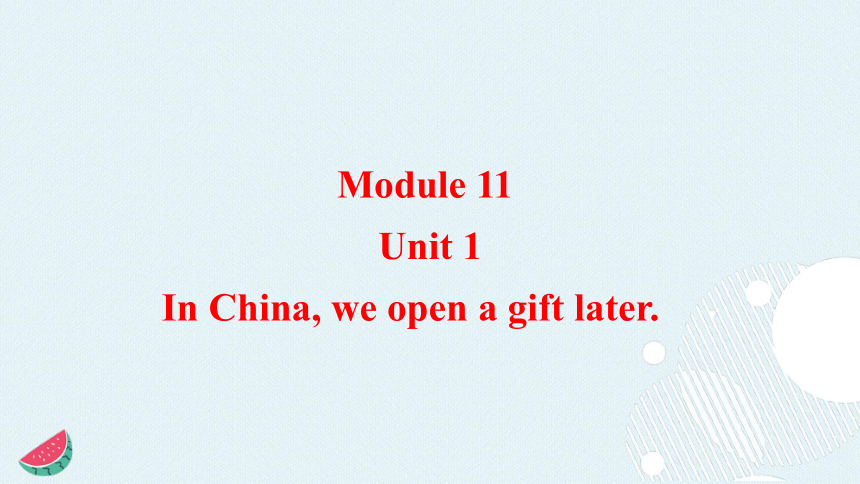
|
|
| 格式 | pptx | ||
| 文件大小 | 18.1MB | ||
| 资源类型 | 教案 | ||
| 版本资源 | 外研版 | ||
| 科目 | 英语 | ||
| 更新时间 | 2024-08-05 00:00:00 | ||
图片预览

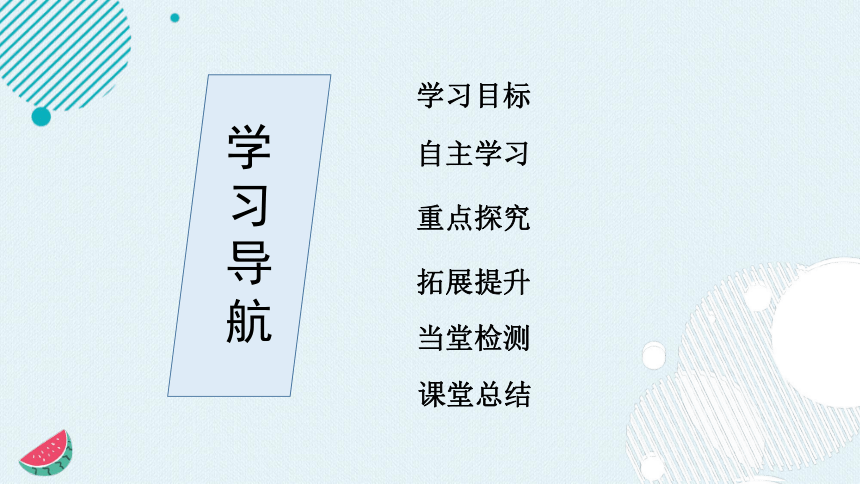
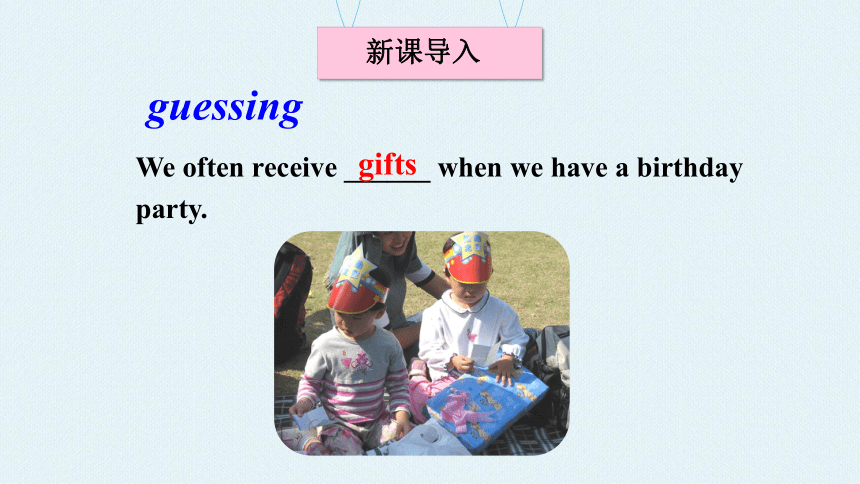
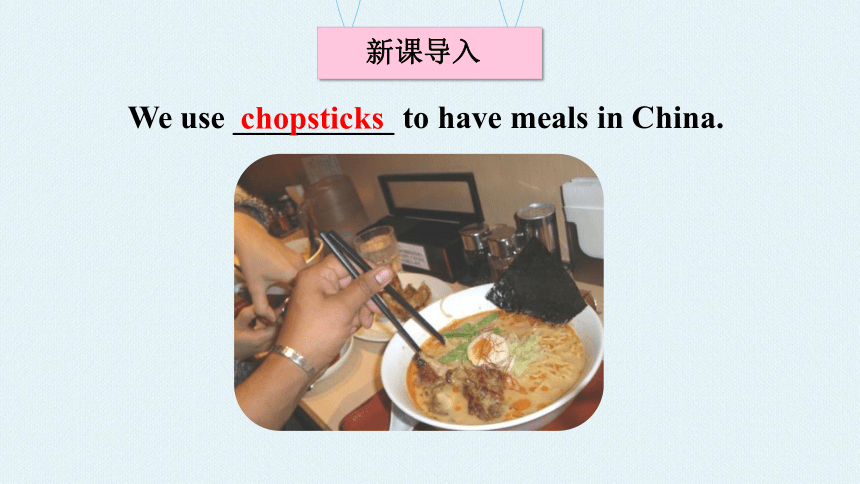
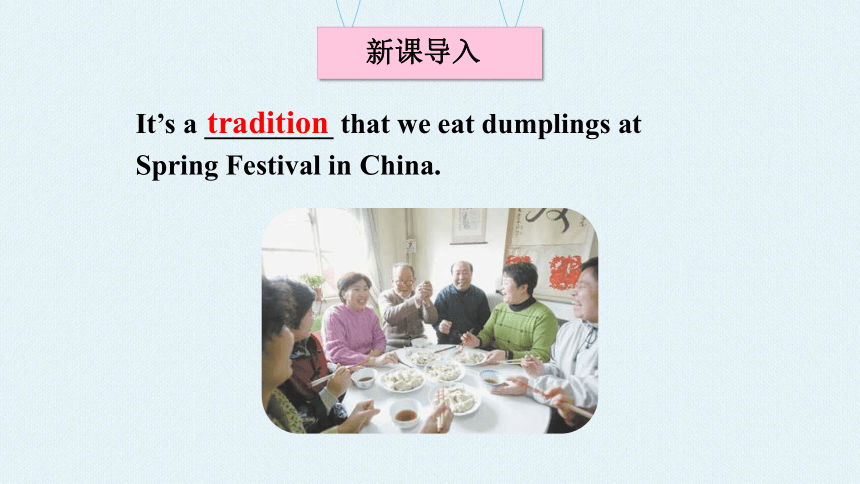
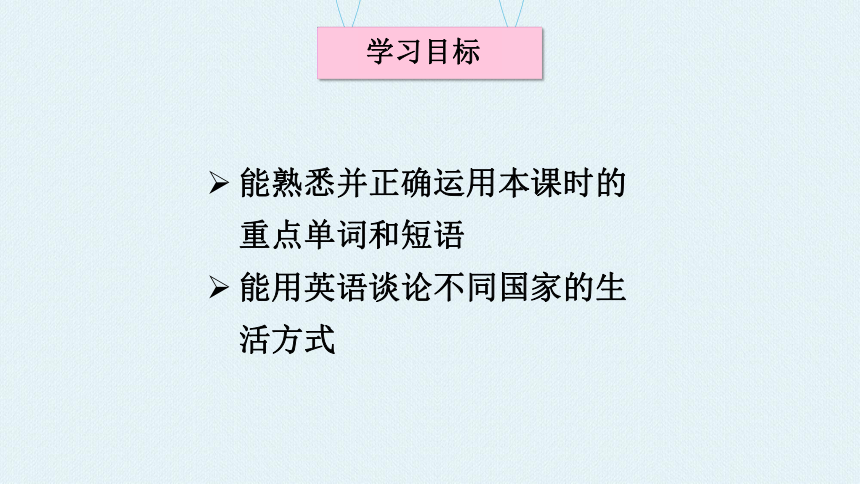
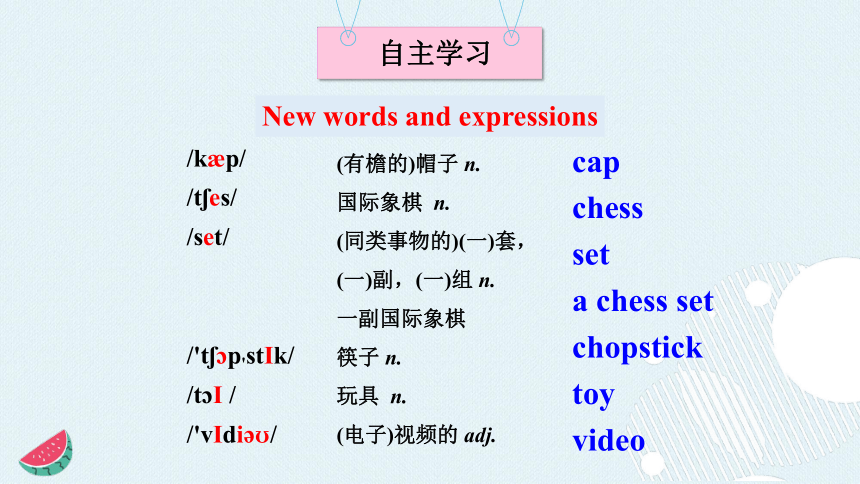
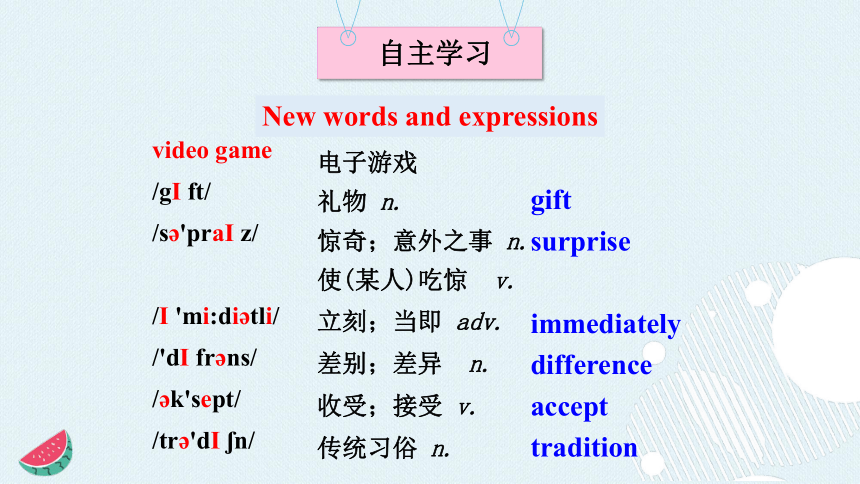
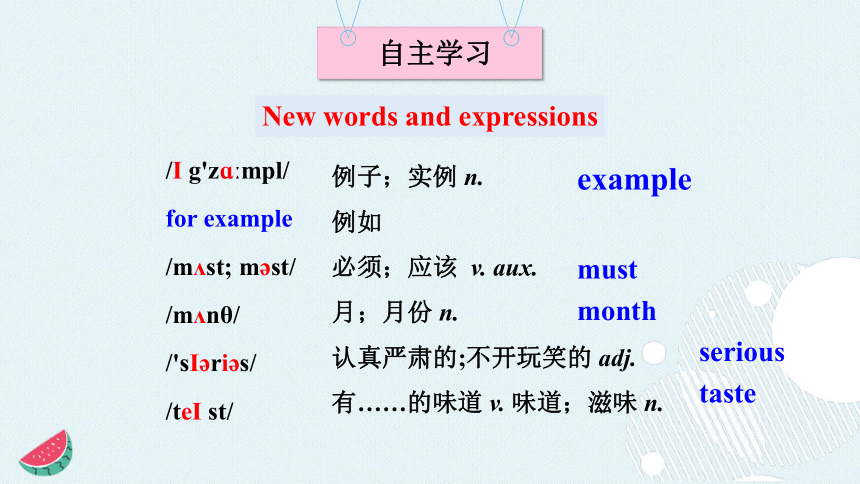
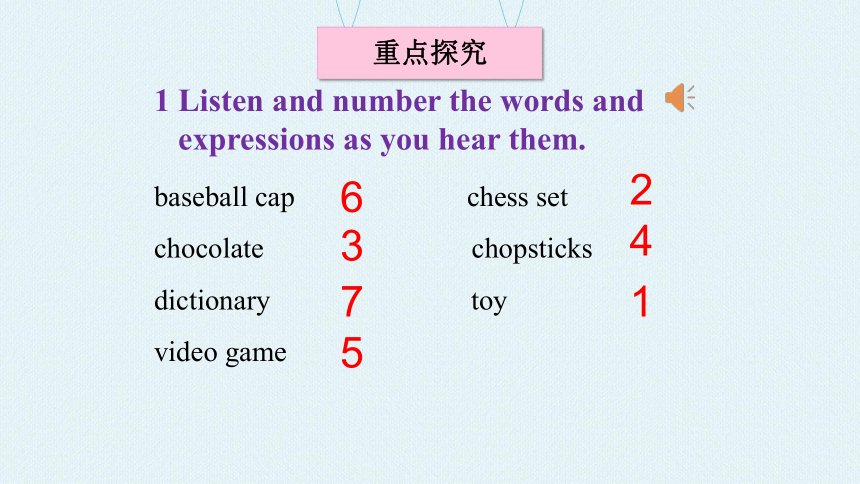
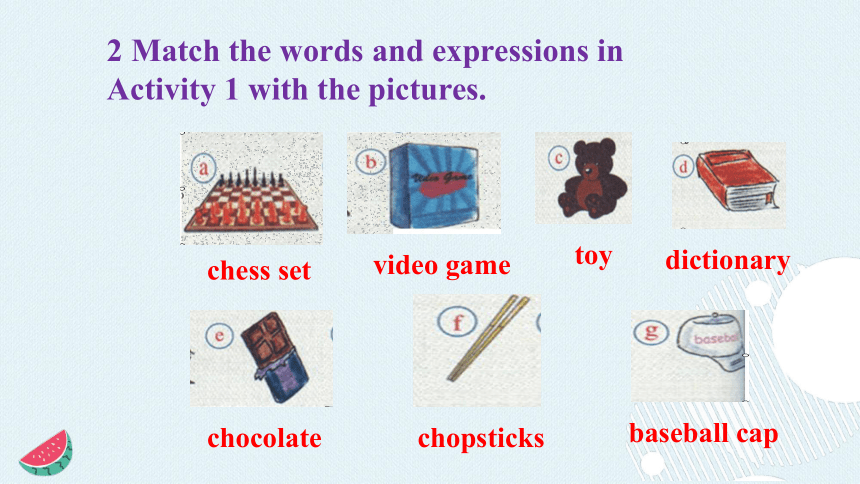
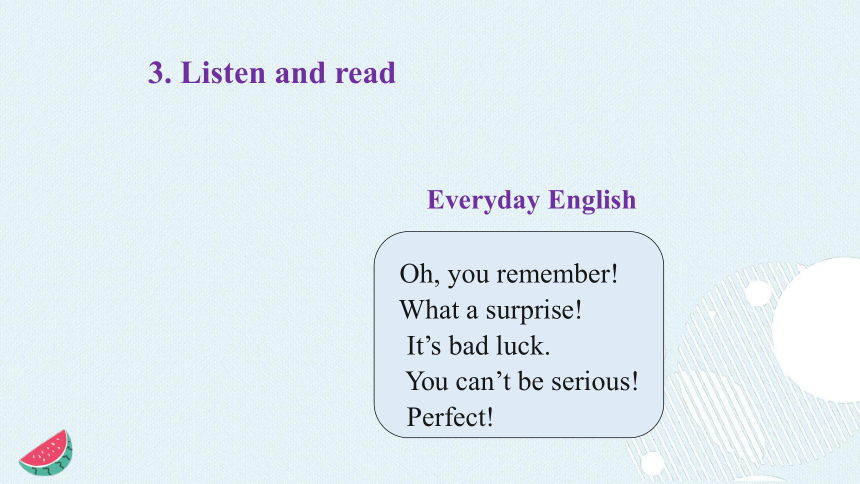
文档简介
(共36张PPT)
Module 11
Unit 1
In China, we open a gift later.
学习目标
重点探究
自主学习
学习导航
当堂检测
课堂总结
拓展提升
新课导入
We often receive ______ when we have a birthday party.
gifts
guessing
新课导入
We use __________ to have meals in China.
chopsticks
新课导入
It’s a _________ that we eat dumplings at Spring Festival in China.
tradition
学习目标
能熟悉并正确运用本课时的重点单词和短语
能用英语谈论不同国家的生活方式
自主学习
New words and expressions
/k p/
/t es/
/set/
/'t p'stIk/
/t I /
/'vIdi /
(有檐的)帽子 n.
国际象棋 n.
(同类事物的)(一)套,(一)副,(一)组 n.
一副国际象棋
筷子 n.
玩具 n.
(电子)视频的 adj.
cap
chess
set
a chess set
chopstick
toy
video
自主学习
New words and expressions
video game
/gI ft/
/s 'praI z/
/I 'mi:di tli/
/'dI fr ns/
/ k'sept/
/tr 'dI n/
电子游戏
礼物 n.
惊奇;意外之事 n.
使(某人)吃惊 v.
立刻;当即 adv.
差别;差异 n.
收受;接受 v.
传统习俗 n.
gift
surprise
immediately
difference
accept
tradition
自主学习
New words and expressions
/I g'zɑ mpl/
for example
/m st; m st/
/m nθ/
/'sI ri s/
/teI st/
例子;实例 n.
例如
必须;应该 v. aux.
月;月份 n.
认真严肃的;不开玩笑的 adj.
有……的味道 v. 味道;滋味 n.
example
must
month
serious
taste
重点探究
1 Listen and number the words and
expressions as you hear them.
baseball cap chess set
chocolate chopsticks
dictionary toy
video game
6
2
3
7
5
4
1
2 Match the words and expressions in
Activity 1 with the pictures.
chess set
toy
baseball cap
video game
dictionary
chocolate
chopsticks
3. Listen and read
Everyday English
Oh, you remember!
What a surprise!
It’s bad luck.
You can’t be serious!
Perfect!
Betty: Happy birthday, Lingling.
Daming: Here’s your gift.
Lingling: Oh, you remembered! What a surprise!
Tony: You can open it!
Lingling: I don’t think I should open it now. In
China, we open a gift later.
Betty: But back in the US, we open a gift immediately.
Lingling: So what do I do
Betty: You needn’t wait!
(Lingling opens her presents and finds a dictionary.)
Lingling: Oh, thank you. I really wanted one.
Betty: We’re happy you like it.
Tony: I noticed another difference. In China, you
accept a gift with both hands. But in the west,
we usually don’t pay much attention to that.
Betty: That’s interesting! I’m interested to know all
the Chinese traditions. Tell me more.
Lingling: There are a lot. For example, in my home
town, people say you mustn’t do any
cleaning on the first day of the Spring
Festival. And you mustn’t break anything.
It’s bad luck.
Daming: You must only use red paper for hongbao
because red means luck. And you’d better
not have your hair cut during the Spring
Festival month.
Tony: You can’t be serious!
Daming: And in the north of China, people eat lots
of Jiaozi!
Betty: Perfect! They taste great.
Tony: I like eating jiaozi too. Anyway, the Spring
Festival is still over a month away. Let’s
celebrate Lingling’s birthday first!
Now check (√) what you usually do in China.
1 Open a present immediately when you receive it.
2 Accept a present with both hands.
3 Use red paper for hongbao.
4 Do cleaning on the first day of the Spring Festival.
5 Cut your hair during the Spring Festival.
6 Break something during the Spring Festival.
√
√
4 Complete the passage with the words in the box.
It is always a(n)(1) to receive gifts from
family members and friends. In China, we usually
(2) a gift with both hands and open it later.
But in the west, people usually do not pay much
(3) to that. During the Spring Festival, there
are many (4) . For example, people in the
north of China eat lots of jiaozi. They (5) great.
accept attention surprise taste traditions
traditions
surprise
accept
attention
taste
5 Read and predict how the speaker will
pronounce the underlined words.
1 I don’t think I should open it now.
2 You needn’t wait.
3 You mustn’t break anything.
4 You must only use red paper for hongbao.
5 You’d better not cut your hair during the Spring
Festival month.
Now listen and check.
6 Read the sentences in Activity 5 aloud.
7 Think about what you must and mustn’t /
can’t do in the situations. Write notes.
Must Mustn't/ Can’t
At school Put up your hand before you talk
At the dining table talk with food in your mouth
Now work in pairs. Say what you mustn't/ can’t do.
拓展提升
1. What’s a surprise!
surprise表示“惊奇,意外之事”。是名词。 e.g. — Although he is only ten years
old, he runs the fastest.
— What a surprise!
——尽管他只有十岁,但他跑得是最快的。
——多么神奇!
2. …we open a gift immediately.
immediately adv. 立即;直接地
e.g. Mary answered Peter's letter immediately.
玛丽立即给彼得回了信。
3. For example, in my hometown, people say youmustn’t do any cleaning on the first day of the Spring Festival.
for example 例如
e.g. You can buy fruit here-oranges
and bananas, for example.
你可以在这里买水果,例如买柑橘和香蕉。
4. You must only use red paper for hongbao because red means luck.
must表示“必须”,后面加动词原形。
mustn’t表示“禁止,一定不要”
e.g. You must go to school on time.
你必须按时上学。
5. You can’t be serious!
serious adj. 表示“认真的,不开玩笑的”。
e.g.
— You got a full mark in the exam.
— You can’t be serious!
你考试必须拿满分。
你是开玩笑的吧!
must 的用法
1) 表示主观的义务和必要,主要用于肯定句和疑问句,意思为 “必须……,得……,要……”
由must引起的疑问句,肯定回答要用must
否定回答要用needn’t,意思是“不必”
must的否定形式mustn’t 表示禁止,意思是“不能,不许”。
e.g.
—Must I finish the task right now
—No, you needn’t.
我必须现在就完成任务吗?
不,你不需要。
You mustn’t come here without permission.
没有允许你不准来这。
2) 表示肯定的猜测,常用于肯定句中,
意为 “一定是,必然……”。
e.g. Your sister must be a doctor in this hospital.
你的妹妹现在一定在这家医院当医生。
He must be reading newspapers in the reading room now.
他现在肯定正在阅读室看报纸。
have to 与must的区别
两都都表示“必须”,但must侧重于说话者的主观看法,认为有必要或有义务去做某事;have to侧重于客观需要,含有“不得不,被迫”之意。
e.g. All passengers must wear seat belts.
所有乘客都要系安全带。
My bike was broken yesterday, so I
had to walk to school.
昨天我的自行车坏了,所以我只能走路去学校。
can 的用法
can的否定形式为cannot,缩写为can't。
1) 表示能力
e.g. I can’t swim. 我不会游泳。
Can you drive? 你会开车吗?
注意:
can表示能力可与be able to互换使用,且后者有更多的时态,be able to常被用来表示can所不能表示的将来或完成的概念。
e.g. They will be able to run this machine
on their own in three months.
他们将在未来的三个月自己操作这
个机器。
2) 表示可能性,意思是:可以,可能。
e.g.
He can be very friendly at times.
他有时可能非常友善。
3) 表示允诺,意思是:可以,能够。
e.g. You can have the book when I have finished it.
在我读完这本书后,你可以看。
Can I use your pen
我能用下你的笔吗?
4) 表示惊异、不相信、猜测等(用于疑问句、否定句或感叹句中),意思是:会,可能。
e.g. This can’t be true.
这不可能是真的。
Can it be true?
这能成真吗?
当堂检测
根据括号中的提示完成句子。
1. It's not polite ___________ somebody _________ the head.(touch;in/on)
2. —Must I finish the work today
—No, you _________. You can have a rest first.(must)
3. —What do you think of this book
—It's boring. There's _____________________ in it.
(everything interested)
4. —Jenny always talks to people _________.
—Yes, she is really a _________ girl.(polite)
5. —David got the first prize in the swimming competition.
—__________________ He isn't good at swimming at all!
(意外之外啊!)
to touch on
needn't
nothing interesting
politely
polite
What a surprise!
课堂总结
Module 11
Unit 1
must 的用法
have to 与must的区别
can 的用法
重点单词:
surprise
immediately
for example
must/mustn’t
serious
Module 11
Unit 1
In China, we open a gift later.
学习目标
重点探究
自主学习
学习导航
当堂检测
课堂总结
拓展提升
新课导入
We often receive ______ when we have a birthday party.
gifts
guessing
新课导入
We use __________ to have meals in China.
chopsticks
新课导入
It’s a _________ that we eat dumplings at Spring Festival in China.
tradition
学习目标
能熟悉并正确运用本课时的重点单词和短语
能用英语谈论不同国家的生活方式
自主学习
New words and expressions
/k p/
/t es/
/set/
/'t p'stIk/
/t I /
/'vIdi /
(有檐的)帽子 n.
国际象棋 n.
(同类事物的)(一)套,(一)副,(一)组 n.
一副国际象棋
筷子 n.
玩具 n.
(电子)视频的 adj.
cap
chess
set
a chess set
chopstick
toy
video
自主学习
New words and expressions
video game
/gI ft/
/s 'praI z/
/I 'mi:di tli/
/'dI fr ns/
/ k'sept/
/tr 'dI n/
电子游戏
礼物 n.
惊奇;意外之事 n.
使(某人)吃惊 v.
立刻;当即 adv.
差别;差异 n.
收受;接受 v.
传统习俗 n.
gift
surprise
immediately
difference
accept
tradition
自主学习
New words and expressions
/I g'zɑ mpl/
for example
/m st; m st/
/m nθ/
/'sI ri s/
/teI st/
例子;实例 n.
例如
必须;应该 v. aux.
月;月份 n.
认真严肃的;不开玩笑的 adj.
有……的味道 v. 味道;滋味 n.
example
must
month
serious
taste
重点探究
1 Listen and number the words and
expressions as you hear them.
baseball cap chess set
chocolate chopsticks
dictionary toy
video game
6
2
3
7
5
4
1
2 Match the words and expressions in
Activity 1 with the pictures.
chess set
toy
baseball cap
video game
dictionary
chocolate
chopsticks
3. Listen and read
Everyday English
Oh, you remember!
What a surprise!
It’s bad luck.
You can’t be serious!
Perfect!
Betty: Happy birthday, Lingling.
Daming: Here’s your gift.
Lingling: Oh, you remembered! What a surprise!
Tony: You can open it!
Lingling: I don’t think I should open it now. In
China, we open a gift later.
Betty: But back in the US, we open a gift immediately.
Lingling: So what do I do
Betty: You needn’t wait!
(Lingling opens her presents and finds a dictionary.)
Lingling: Oh, thank you. I really wanted one.
Betty: We’re happy you like it.
Tony: I noticed another difference. In China, you
accept a gift with both hands. But in the west,
we usually don’t pay much attention to that.
Betty: That’s interesting! I’m interested to know all
the Chinese traditions. Tell me more.
Lingling: There are a lot. For example, in my home
town, people say you mustn’t do any
cleaning on the first day of the Spring
Festival. And you mustn’t break anything.
It’s bad luck.
Daming: You must only use red paper for hongbao
because red means luck. And you’d better
not have your hair cut during the Spring
Festival month.
Tony: You can’t be serious!
Daming: And in the north of China, people eat lots
of Jiaozi!
Betty: Perfect! They taste great.
Tony: I like eating jiaozi too. Anyway, the Spring
Festival is still over a month away. Let’s
celebrate Lingling’s birthday first!
Now check (√) what you usually do in China.
1 Open a present immediately when you receive it.
2 Accept a present with both hands.
3 Use red paper for hongbao.
4 Do cleaning on the first day of the Spring Festival.
5 Cut your hair during the Spring Festival.
6 Break something during the Spring Festival.
√
√
4 Complete the passage with the words in the box.
It is always a(n)(1) to receive gifts from
family members and friends. In China, we usually
(2) a gift with both hands and open it later.
But in the west, people usually do not pay much
(3) to that. During the Spring Festival, there
are many (4) . For example, people in the
north of China eat lots of jiaozi. They (5) great.
accept attention surprise taste traditions
traditions
surprise
accept
attention
taste
5 Read and predict how the speaker will
pronounce the underlined words.
1 I don’t think I should open it now.
2 You needn’t wait.
3 You mustn’t break anything.
4 You must only use red paper for hongbao.
5 You’d better not cut your hair during the Spring
Festival month.
Now listen and check.
6 Read the sentences in Activity 5 aloud.
7 Think about what you must and mustn’t /
can’t do in the situations. Write notes.
Must Mustn't/ Can’t
At school Put up your hand before you talk
At the dining table talk with food in your mouth
Now work in pairs. Say what you mustn't/ can’t do.
拓展提升
1. What’s a surprise!
surprise表示“惊奇,意外之事”。是名词。 e.g. — Although he is only ten years
old, he runs the fastest.
— What a surprise!
——尽管他只有十岁,但他跑得是最快的。
——多么神奇!
2. …we open a gift immediately.
immediately adv. 立即;直接地
e.g. Mary answered Peter's letter immediately.
玛丽立即给彼得回了信。
3. For example, in my hometown, people say youmustn’t do any cleaning on the first day of the Spring Festival.
for example 例如
e.g. You can buy fruit here-oranges
and bananas, for example.
你可以在这里买水果,例如买柑橘和香蕉。
4. You must only use red paper for hongbao because red means luck.
must表示“必须”,后面加动词原形。
mustn’t表示“禁止,一定不要”
e.g. You must go to school on time.
你必须按时上学。
5. You can’t be serious!
serious adj. 表示“认真的,不开玩笑的”。
e.g.
— You got a full mark in the exam.
— You can’t be serious!
你考试必须拿满分。
你是开玩笑的吧!
must 的用法
1) 表示主观的义务和必要,主要用于肯定句和疑问句,意思为 “必须……,得……,要……”
由must引起的疑问句,肯定回答要用must
否定回答要用needn’t,意思是“不必”
must的否定形式mustn’t 表示禁止,意思是“不能,不许”。
e.g.
—Must I finish the task right now
—No, you needn’t.
我必须现在就完成任务吗?
不,你不需要。
You mustn’t come here without permission.
没有允许你不准来这。
2) 表示肯定的猜测,常用于肯定句中,
意为 “一定是,必然……”。
e.g. Your sister must be a doctor in this hospital.
你的妹妹现在一定在这家医院当医生。
He must be reading newspapers in the reading room now.
他现在肯定正在阅读室看报纸。
have to 与must的区别
两都都表示“必须”,但must侧重于说话者的主观看法,认为有必要或有义务去做某事;have to侧重于客观需要,含有“不得不,被迫”之意。
e.g. All passengers must wear seat belts.
所有乘客都要系安全带。
My bike was broken yesterday, so I
had to walk to school.
昨天我的自行车坏了,所以我只能走路去学校。
can 的用法
can的否定形式为cannot,缩写为can't。
1) 表示能力
e.g. I can’t swim. 我不会游泳。
Can you drive? 你会开车吗?
注意:
can表示能力可与be able to互换使用,且后者有更多的时态,be able to常被用来表示can所不能表示的将来或完成的概念。
e.g. They will be able to run this machine
on their own in three months.
他们将在未来的三个月自己操作这
个机器。
2) 表示可能性,意思是:可以,可能。
e.g.
He can be very friendly at times.
他有时可能非常友善。
3) 表示允诺,意思是:可以,能够。
e.g. You can have the book when I have finished it.
在我读完这本书后,你可以看。
Can I use your pen
我能用下你的笔吗?
4) 表示惊异、不相信、猜测等(用于疑问句、否定句或感叹句中),意思是:会,可能。
e.g. This can’t be true.
这不可能是真的。
Can it be true?
这能成真吗?
当堂检测
根据括号中的提示完成句子。
1. It's not polite ___________ somebody _________ the head.(touch;in/on)
2. —Must I finish the work today
—No, you _________. You can have a rest first.(must)
3. —What do you think of this book
—It's boring. There's _____________________ in it.
(everything interested)
4. —Jenny always talks to people _________.
—Yes, she is really a _________ girl.(polite)
5. —David got the first prize in the swimming competition.
—__________________ He isn't good at swimming at all!
(意外之外啊!)
to touch on
needn't
nothing interesting
politely
polite
What a surprise!
课堂总结
Module 11
Unit 1
must 的用法
have to 与must的区别
can 的用法
重点单词:
surprise
immediately
for example
must/mustn’t
serious
同课章节目录
- Module 1 How to learn English
- Unit 1 Let's try to speak English as much as possi
- Unit 2 You should smile at her.
- Unit 3 Language in use .
- Module 2 My home town and my country
- Unit 1 It's taller than many other buildings.
- Unit 2 Cambridge is a beautiful city in the east o
- Unit 3 Language in use .
- Module 3 Sports.
- Unit 1 Nothing is more exciting than playing tenni
- Unit 2 This year we training more carefully.
- Unit 3 Language in use .
- Module 4 Planes, ships and trains .
- Unit 1 He lives the farthest from school.
- Unit 2 What is the best way to travel.
- Unit 3 Language in use .
- Module 5 Lao She Teahouse.
- Unit 1 I wanted to see the Beijing Opera.
- Unit 2 It descibes the changes in Chinese society.
- Unit 3 Language in use .
- Module 6 Animals in danger.
- Unit 1 It allows people to get closer to them .
- Unit 2 The WWF is working hard to save them all.
- Unit 3 Language in use .
- Revision module A
- Module 7 A famous story
- Unit 1 Alice was sitting with her sister by the ri
- Unit 2 She was thinking about her cat.
- Unit 3 Language in use .
- Module 8 Accidents
- Unit 1 While the car were changing to red, a car s
- Unit 2 I was trying to pick it up when it bite me
- Unit 3 Language in use .
- Module 9 Population
- Unit 1 The population of China is about 1.37 billi
- Unit 2 Arnwick was a city with 200,000 people.
- Unit 3 Language in use .
- Module 10 The weathe
- Unit 1 It might snow.
- Unit 2 The weather is fine all year round.
- Unit 3 Language in use .
- Module 11 Way of life
- Unit 1 In China ,we open a gift later.
- Unit 2 In England, you usually drink tea with milk
- Unit 3 Language in use .
- Module 12 Help
- Unit 1 What should we do before help arrives?
- Unit 2 Stay away from windows and heavy furniture.
- Unit 3 Language in use .
- Revision module B
